
Lithuania is a Northern country on the south-eastern shore of the Baltic Sea, a member of the United Nations Organisation, the Organisation for Security and Cooperation in Europe, the European Union, the North Atlantic Treaty Organisation, the World Trade Organisation. Currently, Lithuania maintains diplomatic relations with 186 states Lithuania became a member of the United Nations on 18 September 1991, and is a signatory to a number of its organizations and other international agreements. It is also a member of the Organization for Security and Cooperation in Europe, NATO and its adjunct North Atlantic Coordinating Council, the Council of Europe, and the European Union. Lithuania gained membership in the World Trade Organization on 31 May 2001.

The Council of the Baltic Sea States (CBSS) is a regional intergovernmental organisation working on three priority areas:

The Nordic Council is the official body for formal inter-parliamentary Nordic cooperation among the Nordic countries. Formed in 1952, it has 87 representatives from Denmark, Finland, Iceland, Norway, and Sweden as well as from the autonomous areas of the Faroe Islands, Greenland, and Åland. The representatives are members of parliament in their respective countries or areas and are elected by those parliaments. The Council holds ordinary sessions each year in October/November and usually one extra session per year with a specific theme. The council's official languages are Danish, Finnish, Icelandic, Norwegian, and Swedish, though it uses only the mutually intelligible Scandinavian languages—Danish, Norwegian, and Swedish—as its working languages. These three comprise the first language of around 80% of the region's population and are learned as a second or foreign language by the remaining 20%.
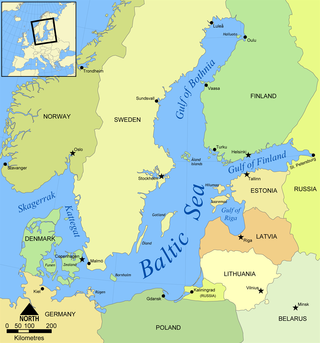
The terms Baltic Sea Region, Baltic Rim countries, and the Baltic Sea countries/states refer to slightly different combinations of countries in the general area surrounding the Baltic Sea, mainly in Northern Europe. The term "Baltic states" refers specifically to one such grouping.
European integration is the process of industrial, economic, political, legal, social, and cultural integration of states wholly or partially in Europe or nearby. European integration has primarily come about through the European Union and its policies.

The Northern Dimension (ND) is a joint policy between four equal partners – the European Union, Russia, Norway and Iceland – regarding the cross-border and external policies geographically covering Northwest Russia, the Baltic Sea and the Arctic regions, including the Barents Region. The ND Policy was initiated in 1999 and renewed in 2006. The Northern Dimension addresses the specific challenges and opportunities arising in those regions and aims to strengthen dialogue and cooperation between the EU and its member states, the northern countries associated with the EU under the European Economic Area and Russia. A particular emphasis is placed on subsidiarity, and on ensuring the active participation of all stakeholders in the North, including regional organizations, local and regional authorities, the academic and business communities, and civil society.

The Baltic Assembly (BA) is a regional organisation that promotes intergovernmental cooperation between Estonia, Latvia, and Lithuania. It attempts to find a common position in relation to many international issues, including economic, political and cultural issues. The decisions of the assembly are advisory.
Baltic 21 is a plan to cooperate on implementing regional sustainable development. It is managed by the Council of the Baltic Sea States (CBSS).
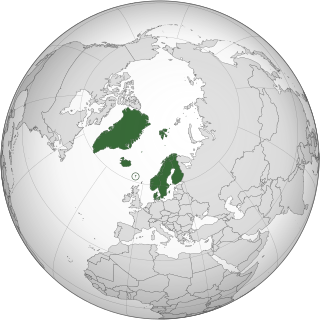
The Nordic countries are a geographical and cultural region in Northern Europe and the North Atlantic. It includes the sovereign states of Denmark, Finland, Iceland, Norway and Sweden; the autonomous territories of the Faroe Islands and Greenland; and the autonomous region of Åland.
The Baltic Development Forum is an independent think-tank and non-profit high-level and agenda-setting networking organisation with strategic partners and sponsors from large companies, major cities, institutional investors, business associations and academia in the Baltic Sea Region. The network involves more than 8,000 decision-makers from all over the region and beyond.
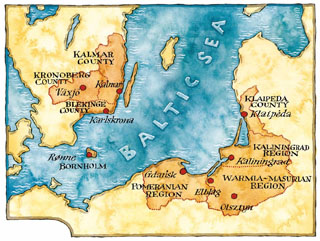
The Euroregion Baltic (ERB) refers to a cross-border Euroregion in the south-east of the Baltic Sea Region, consisting of eight regions of Denmark, Lithuania, Poland, Russia, and Sweden. On 2 March 2022, the ERB's Executive Board suspended Russia's membership, in response to Russia's invasion of Ukraine.

Arctic cooperation and politics are partially coordinated via the Arctic Council, composed of the eight Arctic nations: the United States, Canada, Iceland, Norway, Sweden, Finland, Russia, and Denmark with Greenland and the Faroe Islands. The dominant governmental power in Arctic policy resides within the executive offices, legislative bodies, and implementing agencies of the eight Arctic nations, and to a lesser extent other nations, such as United Kingdom, Germany, European Union and China. NGOs and academia play a large part in Arctic policy. Also important are intergovernmental bodies such as the United Nations and NATO.
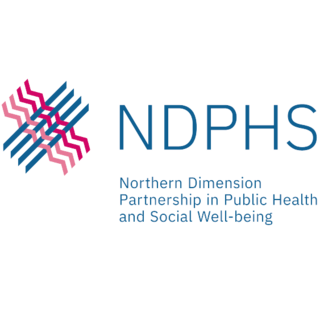
The Northern Dimension Partnership in Public Health and Social Well-being (NDPHS) is an international networking platform for strengthening professional connections, sharing and co-creating knowledge, and developing joint activities in public health and social well-being. The Partnership is served by the NDPHS Secretariat that was established in 2012 as an international legal entity hosted by the Swedish Government located in Stockholm and funded jointly by the Partner Countries.

Nordic-Baltic Eight (NB8) is a regional co-operation format that includes Denmark, Estonia, Finland, Iceland, Latvia, Lithuania, Norway, and Sweden. Under NB8, regular meetings are held of the Baltic and Nordic countries' Prime Ministers, Speakers of Parliaments, Foreign Ministers, branch ministers, Secretaries of State and political directors of Foreign Ministries, as well as expert consultations where regional issues and current international topics are reviewed.

The Parliamentary Assembly of the Mediterranean (PAM) is an international organization established in 2005 by the national parliaments of the countries of the Euro-Mediterranean region. It is the legal successor of the Conference on Security and Cooperation in the Mediterranean (CSCM), launched in the early 1990s.
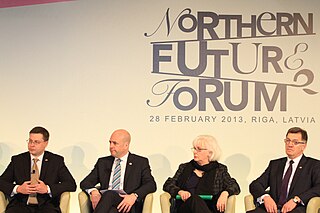
Northern Future Forum is an annual, informal meeting of prime ministers, policy innovators, entrepreneurs and business leaders from the 9 nations of Denmark, Estonia, Finland, Iceland, Latvia, Lithuania, Norway, Sweden and the United Kingdom. Initially referred to as the UK Nordic Baltic Summit, the name Northern Future Forum was introduced at the second meeting in Stockholm, 2012. The group had a period of abeyance since the Stavanger meeting in 2016 was postponed following the outcome of the 2016 United Kingdom European Union membership referendum, and David Cameron subsequently stepping down as UK prime minister, to be succeeded by Theresa May. The summit was reconvened in October 2018 in Oslo.

The Southern Baltic Sea Parliamentary Forum was founded in 2004 as a forum for the regional parliaments of Schleswig-Holstein, Hamburg, Mecklenburg-Western Pomerania (Mecklenburg-Vorpommern), West Pomerania (Westpommern), Pomerania (Pommern), Warmia-Masuria (Ermland-Masuren) and the administrative district of Kaliningrad. The regional parliament of the southern Swedish province Schonen is an associated Member.

















